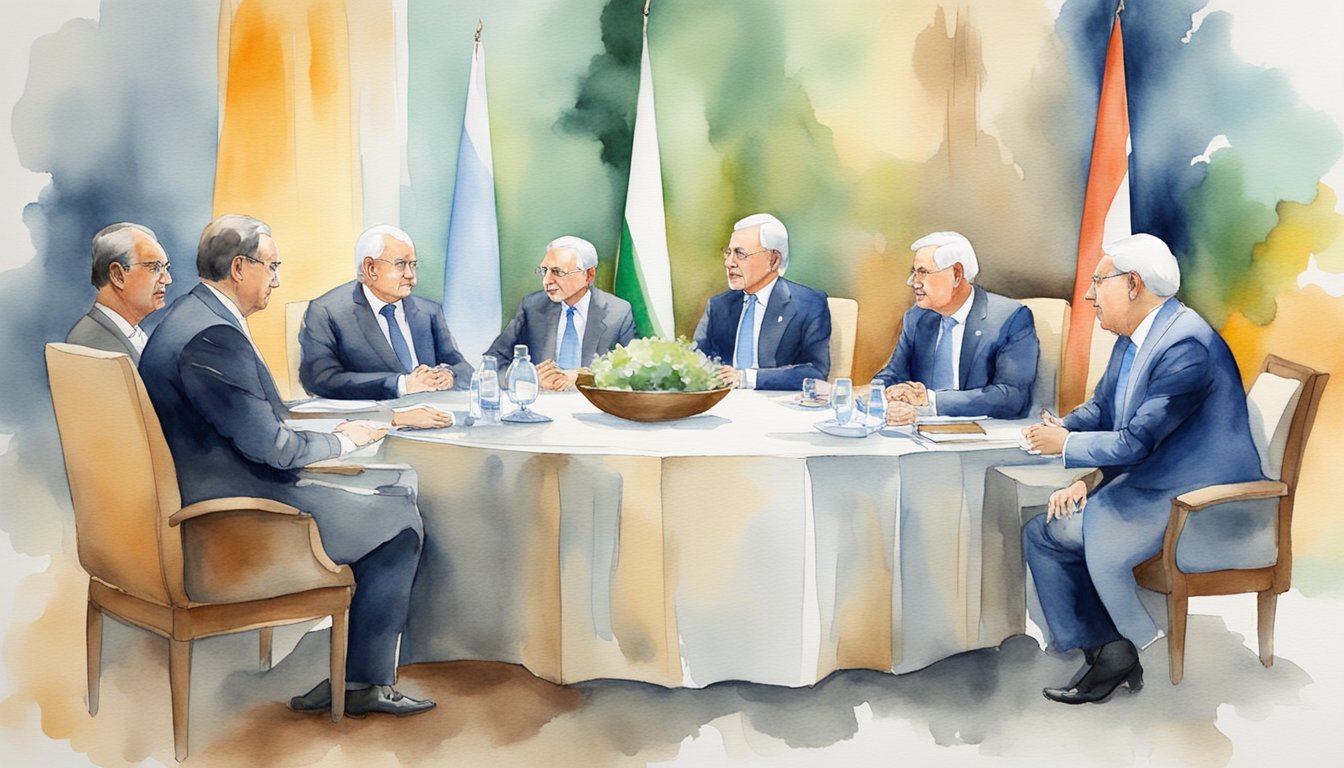Historical Context of the Middle East Crisis
Rise of Tensions in Middle East
The Middle East has been a region of recurring tensions and conflicts. A significant part of these tensions can be traced back to the escalating power struggle between the United States and Iran1. Iran has been actively supporting Shiite movements, such as Hamas and Hezbollah, forming what is known as the “Axis of Resistance” which has contributed to the conflicts within the region1. The involvement of international players, like the United States, has shaped the regional dynamics, making it a complex and multifaceted crisis.
The Israeli-Palestinian Conflict
A long-standing element of the Middle East crisis is the Israeli-Palestinian conflict2. This conflict dates back decades and has seen numerous attempts at brokering peace and ceasefires, yet with limited success2. The situation in East Jerusalem, Gaza, and the West Bank has been a constant source of tension on a regional and global level2. Additionally, internal Palestinian divisions between groups such as Hamas, which controls Gaza, and the Fatah party, which controls the West Bank, have further complicated the prospects of peace and stability in the region3.
Regional Impact of the Crisis
The Middle East crisis has had a profound impact on the neighboring countries, such as Lebanon and Syria4. These countries have suffered from the regional tensions and have been drawn into the various conflicts, either directly or indirectly. Civilian populations in countries like Syria have been significantly affected, with millions displaced and countless lives lost4. The crisis has also involved several international players, leading to a geopolitical struggle in the region.
Furthermore, the crisis has had repercussions on international law and the effectiveness of the United Nations (UN) body4. The UN Security Council has been regularly debating and attempting to find solutions to these crises, but has often faced challenges and disagreements among its member states4.
In summary, the Middle East crisis is a deeply complex and evolving situation with historical roots. The rise of tensions, the Israeli-Palestinian conflict, and the far-reaching regional impact have created an environment where achieving peace and stability poses significant challenges.
Current Developments and International Response

Efforts Towards Peace and Security
The Middle East crisis has escalated, with Iran launching hundreds of drones and missiles towards Israel, increasing the risk of a full-scale conflict. The United Nations Secretary-General, António Guterres, has warned that the situation could spill over to neighboring countries. Security Council members have urged all parties, including the Israeli military and Palestinian factions, to exercise restraint and work towards de-escalation.
In response to the crisis, multiple countries have stepped up their efforts in global and regional diplomacy. The US has engaged with its allies, including the UK, France, Germany, and other nations in the G7, in a coordinated effort to push for peace in the region. Meanwhile, countries such as Egypt, Jordan, Qatar, and the United Arab Emirates have been actively involved in mediation and negotiations.
Humanitarian Assistance Initiatives
The growing humanitarian situation has compelled the international community to respond. The UN Relief and Works Agency (UNRWA) is working on the ground to provide humanitarian aid to Palestinian civilians. The US House of Representatives passed a foreign aid package of $95 billion, including provisions to be used for humanitarian assistance and national security purposes. The World Food Program and other international organizations are also coordinating efforts to provide relief and prevent further suffering.
| Country | Humanitarian Aid Commitment |
|---|---|
| United States | $95 billion |
| Germany | $40 million |
| United Arab Emirates | $30 million |
Global and Regional Diplomacy
Dealing with this crisis has brought together numerous countries, both from the region and beyond, to negotiate a peaceful resolution. President Biden and Israeli Prime Minister have started communication regarding the crisis, while China, Russia, and Algeria are engaged in diplomatic talks through the United Nations Security Council.
Countries in the region, including Egypt, Iran, and Iraq, are also participating in discussions, focusing on peacebuilding, mutual security concerns, and humanitarian aid. The collective effort by world powers and regional allies shows a unified commitment to resolve the Middle East’s ongoing crisis, ultimately aiming for peaceful coexistence and the avoidance of further violence.
In summary, the current developments in the Middle East crisis have led to a resolute international response, with efforts encompassing peace, security, humanitarian assistance, and global diplomacy. Countries and organizations have come together to address an escalating regional conflict, hoping to achieve stability and reduce the suffering of civilians caught in the midst of violence.

